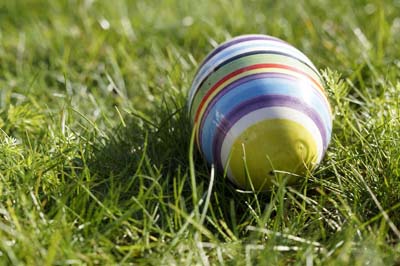
Peter Cottontail isn’t the only furry creature excited about Easter. Our dogs and cats love this time of year, with the warmer weather, greener grass, and interesting treats. Unfortunately, many of these “treats” will involve medical “treatment” if consumed.
Here are a few Easter warnings to help keep your pets safe:
- Easter grass. Colorful artificial grass really screams, “Spring is here!” But if you use it in your Easter basket, keep it out of your pet’s reach. Consumption of artificial grass can cause minor gastrointestinal problems like constipation or vomiting, but it can also cause major problems like intestinal blockages that may require surgery. So, either place the Easter basket in a safe place or opt for tissue paper fillers.
- Easter eggs. Both real and plastic eggs can be harmful to your pet. Consumption of real eggs can cause an upset stomach when munched upon and can cause a blockage if swallowed whole. And yes, some dogs gulp without chewing! Egg shells aren’t readily digested so the effects of eating hard boiled eggs can cause several days of discomfort. Plus, we all know that some people hide Easter eggs in impossible places; however, even if we can’t find them, our dogs eventually will. As the egg stuck under the Azalea bush ages, it smells…and as it smells, it becomes more “findable.” Consumption of rotten eggs never has a good outcome. Plastic eggs don’t spoil, but they also don’t digest which means you’ll be monitoring your dog’s poop until he passes them. And if he doesn’t pass them, you’ll be at the veterinary hospital for assistance. Talk about laying the golden egg!
- Easter lilies. What a beautiful hallmark of the Easter season! Lilies at Easter are like Poinsettias at Christmas….lovely and poisonous. Cats have a tendency to nibble on the flowers and dogs may gobble them up. These flowers are toxic and may cause GI upset (vomiting and diarrhea), lethargy, and kidney failure. If your plant looks a little shaggy and you suspect that your pet has done a little unwarranted pruning, call your veterinarian.
- Easter candy. Yum! Can’t wait to eat the ears off your chocolate Easter bunny? Enjoy your treat, but don’t share it with your cat or dog. Chocolate contains a chemical called theobromine that can cause vomiting, diarrhea, hyperactivity, elevated heart rate and even seizures when consumed by pets. Dark chocolate may be healthier for us, but it’s even more toxic for cats and dogs. And some pets don’t remove the foil wrappers before eating their candy, which can worsen the situation. If your pet eats your Easter candy, call your veterinarian for help.
- “Diet” Easter candy. OK, so some of us splurge a lot on Easter morning and some of us splurge a little. If you are one of the conservative crowd that has candy with sugar substitute instead of real sugar, good for you – but still bad for your pet. Sugar substitutes, like xylitol, can be toxic to dogs and cats and may cause a drop in blood sugar, seizures, and liver failure. So, the advice here is the same as always, keep candy out of your pet’s reach.
With all the fun stuff out of reach, how can our pets enjoy Easter? Well, we can give them a safe Easter treat like a new chew toy or take them for a long walk in the warmer weather. Spending time with your pet is really the best treat.